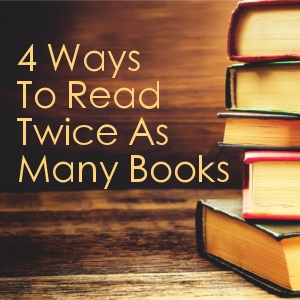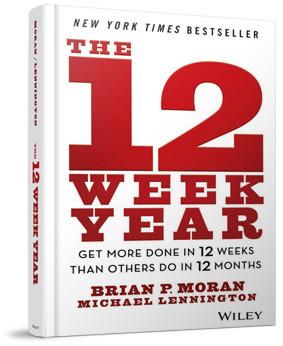 After my first year of college, I decided to do something different over the summer—read a lot of books.
After my first year of college, I decided to do something different over the summer—read a lot of books.
I used a portion of my Monthly Performance Reports to put my reading lists on full display. While I normally read 5-10 books in a given month, the summer days allowed that reading list to morph into 30 books every month.
I didn’t take time off from my business during this time. In fact, I dramatically increased the amount of books I read while preparing to lead a Content Marketing Success Summit, one of the biggest projects of my life up to that point.
In this blog post, I’ll share my story so you can reap the benefits of reading 30 books every month without feeling overwhelmed by work, your personal life, or anything else.
#1: Have The Books On Hand
Before I began my 30-book per month reading journey, I knew I needed to have all of the books readily accessible. So, to put it bluntly, I went on a bargain buying spree.
I knew that by the time I finished reading any given book it would be filled with notes and underlines, so I didn’t mind buying used books (as long as they didn’t have any underlining or highlighting included).
My adventure began on eBay where some people are desperate to part ways with their books. Because the bulk lots included anywhere from 10-20 books per order, I bought books at a rate from $1 to $4 per book depending on who was selling them.
And all of these books were LEGIT, not aged books that are no longer relevant. In fact, I published several books before social media taught me the marketing tactics that work today (often overlooked in the new age of digital marketing).
If you prefer to read books on a device, you’re all set. You can buy all of your books in a few clicks. I prefer reading paperback editions, which is why I decided to purchase books in bulk on eBay.
Buy in bulk
The only problem with book lots is that you don’t get to choose the books on offer; I have multiple copies of the same books because they were a part of a bulk order.
But eventually I learned about Thrift Books, which help you avoid that problem as well as enjoy a wider range of choices and ridiculous bargains.
You may think it’s not worth going through the trouble to find book bargains, but if you want to read 30 books per month, that’s 360 books every year.
In a worst case scenario, saving an average of $10 per book (very possible with book lots and Thrift Books) results in a savings of $3,600 every year!
Don’t Read Word-For-Word
Once you have assembled all of your books, it’s time to read them. But don’t read them in the traditional word-for-word style. Sure, you’ll absorb all of the material if you do, but it will take a longer period of time before you move onto the next book.
When I read books, I skim through them for the most pertinent information. If there’s a section that explains how to create a Twitter account, for example, I skip it because I already have a Twitter account. There’s no need to waste time reading things that you already know.
Similarly, when I buy a productivity book I skip through familiar tips like setting deadlines, 3-Year Plans, and how to set SMART goals. Unless the author shares these common tactics with a very different flavor, I skip to the next part of the book.
Skip Entire Chapters
Not only should you skip over things you already know, you should also get into the habit of skipping portions, or even chapters, of books containing information you don’t want to learn. For instance, I don’t want to learn much about Vine because Vine is a dead social network.
And yet, many of these books have entire chapters dedicated to Vine. Some books are dedicated entirely to the social network. Just remember that information that was once relevant may be outdated today.
You can also skip chapters outlining tasks you don’t want to perform. For instance, I’ll skip a chapter in a podcasting book about editing episodes because I already have a trustworthy freelancer who edits my podcast episodes.
Skipping that chapter allows me to move to the next chapter sooner and, ultimately, to a new book.
Write In Your Book
For a long time I resisted writing in my books, especially signed copies. While I rarely write in books, I often underline with a pencil.
Underlining important points in each of your books makes the re-reading process easier. After all, you have a plan to re-read the best books, right?
At the beginning of each month, I go through my favorite books from the previous month. I skim through what I underlined, and brainstorm ideas. I commit a few hours of one day to this task.
Underlining important text makes this process much faster as I can literally skip hundreds of pages of content. I only focus on what I’d underlined previously because my past self regarded only those points as important.
A Technicality On Book Length
One thing to remember when reading 30 books in 30 days is that book length matters. It’s much easier to read 30 books that average 200 pages than to read 30 books that average 600 pages.
When dozens of books are delivered to me in one day, I start by reading the shorter books first. It’s likely a good thing that I read Tools Of Titans before I began taking my reading goal seriously.
I like reading the shorter books first because finishing a shorter book gives me the dopamine rush to start reading (and finishing) another book.
Get a string of small wins, and it won’t be long before you can read the occasional 400-600 page book with ease.
It It’s Not Scheduled, It Won’t Happen
If you want reading to become a habit, you must schedule it into your day. I schedule at least one hour of reading time every day.
You should also choose one day a week to dedicate entirely to reading books, no professional work. I designate Fridays as my reading days. And even though I spend several hours reading books on Fridays, it doesn’t feel rigorous. Why? Because Fridays feel like a day off from work.
It’s important to find what works for you, but don’t forget that if it’s not scheduled, it won’t happen.
Turn Your TV And Surfing Time Into Reading Time
Professional work can take up hours of your day, but so can TV and internet surfing. You need to eliminate digital surfing from your life because you’re simply watching life happen instead of making life happen. Spectators watch, superstars perform.
The average American watches 32 hours of television every week. If we all switched from digital surfing to reading self-development books, the world would truly be a better place.
The next time you want to watch a marathon, the last episode of a series, or reruns, crack open a book instead. Repeat the process with other bad habits, and with greater intensity, and you’ll have no problem reading 30 books in 30 days.
In Conclusion
Reading 30 books every 30 days will dramatically expand your knowledge and open the door to a variety of possibilities. Reading all of these books requires a mindset shift and the elimination of bad habits. And, of course, the 30+ books you’ll need on hand before you get started.
What are your thoughts on reading 30 books every day? Have any good book recommendations for us? Please share how you plan to implement this habit into your own life. Sound off in the comments section below.

